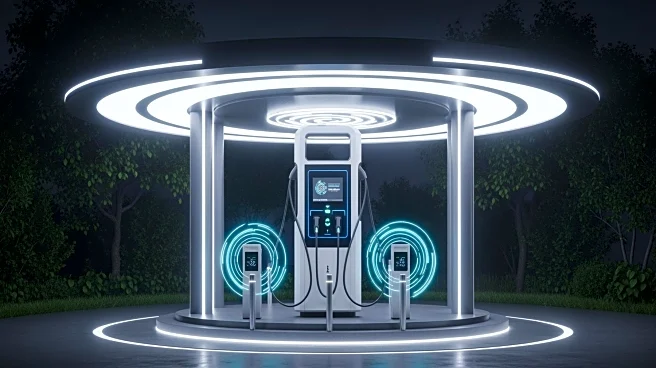What's Happening?
Hyundai Motor Group has launched its Metaplant in Ellabell, Georgia, marking a significant $12.6 billion investment in U.S.-based electric vehicle (EV) and battery manufacturing. The facility, which is the largest public development project in Georgia's
history, is designed to produce 500,000 cars annually, surpassing Tesla's Texas Gigafactory in capacity. The Metaplant employs advanced automation technologies, including 850 robots and automated guided vehicles, to enhance production efficiency. Despite the technological advancements, the plant has faced challenges, including a workplace raid by U.S. Immigration and Customs Enforcement (ICE) that resulted in the deportation of over 300 South Korean workers. The plant's development aligns with the Biden administration's pro-EV policies and Georgia Governor Brian Kemp's vision to make the state a leader in electric mobility.
Why It's Important?
The establishment of Hyundai's Metaplant represents a significant boost to the U.S. manufacturing sector, particularly in the EV market. It underscores the growing trend of automakers investing in domestic production to mitigate risks associated with international trade tensions and tariffs. The plant's advanced automation could set new standards for efficiency and productivity in the automotive industry. However, the ICE raid highlights ongoing challenges related to labor and immigration policies, which could impact future operations. The plant's success is crucial for Hyundai's strategy to compete in the global EV market, especially as consumer adoption of EVs faces headwinds due to the phasing out of federal tax credits.
What's Next?
Hyundai plans to continue expanding its U.S. operations, with additional investments in battery and steel plants. The company aims to source 100% of the Metaplant's energy from renewables by 2030, aligning with broader sustainability goals. The plant's development may influence other automakers to increase their U.S. manufacturing presence, potentially reshaping the domestic automotive landscape. Stakeholders, including local governments and industry leaders, will likely monitor the plant's impact on job creation and economic growth in the region.
Beyond the Headlines
The Metaplant's reliance on advanced robotics and automation raises questions about the future of labor in manufacturing. While automation can enhance efficiency, it may also reduce the need for human labor, leading to potential job displacement. The plant's focus on renewable energy and sustainability reflects broader industry trends towards environmentally friendly manufacturing practices. These developments could influence regulatory policies and consumer expectations, driving further innovation in the automotive sector.
















